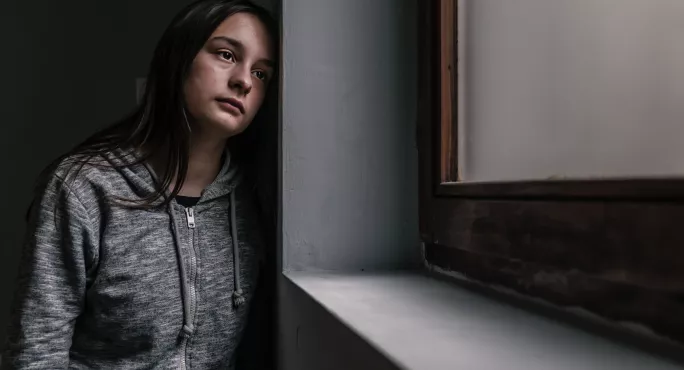
- Home
- Only 5% of heads say Camhs provides help when needed
Only 5% of heads say Camhs provides help when needed

Only one in 20 school leaders agree that pupils referred to Child and Adolescent Mental Health Services (Camhs) get “help when they need it,” according to a new survey published today.
The survey of school leaders reveals that the number of schools commissioning professional help for children’s mental health issues has doubled in the past four years.
And it reveals that 74 per cent of school leaders said the majority of their staff are confident at recognising the signs of mental health problems among children and young people (compared to 61 per cent in 2017).
Read: No Camhs help for 200 miles for pupil in ‘massive decline’
‘Disgusting’: Camhs crisis deepens as self-harmers are turned away
Expert view: Why are we still not spotting autism in girls?
But the NAHT school leaders’ union, which carried out the survey along with children’s mental health charity Place2Be, said there was concern that “professional help is not easily available” for more serious mental health needs.
The association’s general secretary Paul Whiteman said: “We know that early intervention is absolutely key when it comes to mental health and wellbeing.
“We can see that schools are responding to an increasing need and a lack of capacity in specialist services by commissioning their own support such as counsellors.
“Although to be applauded, this is another area where schools are being forced to use scant resources for urgent provision that is not provided for in their budgets.”
‘Enormous postcode lottery’
Last week a report by the children’s commissioner revealed that 40 per cent of schools do not have counselling services, and that only about one in four children with a diagnosable mental health issue had been referred to services last year in what is an “enormous postcode lottery” across the country, with some areas spending 10 times more than others on children’s mental health.
Today’s survey, released on the first day of Children’s Mental Health Week, which takes place this week, also shows that in 2016, 36 per cent of schools in England provided school-based support for students’ emotional and mental wellbeing - but by 2019, this was 66 per cent.
Catherine Roche, chief executive of Place2Be, said: “Three children in every classroom now has a mental health issue, so it is positive to see these results which show that more school leaders are responding to this need by providing professional support for children and young people within school.
“Schools cannot tackle this problem alone. They need expert help in school, backed up by NHS services that can step in when more specialist support is required.”
The survey also revealed that 74 per cent of school leaders said the majority of their staff would be confident understanding the issues that may underlie pupils’ behaviour (compared to 68 per cent in 2017).
And 81 per cent said the majority of their staff had an understanding of how pupils’ mental health impacts on their engagement with learning (compared to 77 per cent in 2017).
However, only 54 per cent thought their staff would be confident in knowing how to respond when mental health is negatively affecting pupils (compared to 47 per cent in 2017), and only 44 per cent said they knew how to respond if a pupil had a mental health crisis (compared to 39 per cent in 2017).
The latest survey was completed by 653 school leaders at the end of 2019.
Other findings included:
- Four per cent of school leaders agreed that Camhs “responds quickly to requests for support”.
- Five per cent agreed that children referred to Camhs “get help when they need it.”
- Seventy-nine per cent agreed their school has a whole school approach to promoting positive mental health and wellbeing.
- 78 per cent said there is a designated member of staff responsible for mental wellbeing in their school or college.
- 67 per cent said staff have undertaken training to help them identify pupils with mental health needs or problems.
The DfE says it is ensuring training for all new teachers prepares them to support pupil mental health, and that it will be providing guidance to schools on the different tools to measure pupil wellbeing.
New mental health support teams, funded by the DfE, will provide dedicated support to schools to provide quicker access to an increased range of support and treatments.
Schools minister Nick Gibb said: “As a government, we are investing hundreds of millions every year in mental health support, including providing better links between mental health experts, schools and colleges and providing quicker access to specialist treatment where needed.
“Through our new compulsory health education, pupils will be taught how to recognise the signs of poor mental health so they can ask for help earlier.”
The DfE also says it has worked with counselling experts, including Place2Be, to develop guidance for schools on how to commission school-based counselling.
Register with Tes and you can read five free articles every month, plus you'll have access to our range of award-winning newsletters.
Keep reading for just £4.90 per month
You've reached your limit of free articles this month. Subscribe for £4.90 per month for three months and get:
- Unlimited access to all Tes magazine content
- Exclusive subscriber-only stories
- Award-winning email newsletters
You've reached your limit of free articles this month. Subscribe for £4.90 per month for three months and get:
- Unlimited access to all Tes magazine content
- Exclusive subscriber-only stories
- Award-winning email newsletters



